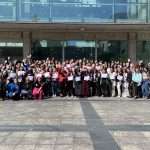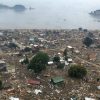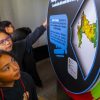The Early Warning System for Rural Water Quality, based on Autonomous Community Monitoring (MOCCA, in Spanish), is one of 22 UdeC initiatives chosen by Fondef IdeA. This innovative project seeks to unite science with community work to strengthen local water management in the Boca Itata and Puahún sectors in the commune of Treguaco, in the Ñuble Region.
By: Antonio Alcayaga and Gonzalo Medina, Journalists at the Department of Sociology / gomedina@udec.cl | Images by Mariela Yevenes and Paulina Cofré
Access to quality water is a fundamental right, especially in rural communities, where limitations in infrastructure and resources complicate its monitoring, unlike in urban centers. To address this need, Dr. Mariela Yévenes, a Professor from the Faculty of Environmental Sciences, Dr. Noelia Benito, a Professor from the Faculty of Physical and Mathematical Science, and Dr. Robinson Torres, Head of the Department of Sociology at the University of Concepción, have created a Citizen Science project.
The initiative (called Early Warning System for Rural Water Quality based on Autonomous Community Monitoring—MOCCA) has funding from ANID’s Fondef IdeA contest. The project is looking to design and build an accessible and autonomous early warning system (EWS) that uses low-cost sensors and a web platform to monitor water quality in real-time. Its citizen science approach aims to strengthen rural communities’ autonomy by providing concrete tools to promptly and efficiently address and/or monitor water quality problems.
The project team has held nine meetings with Boca Itata and Puahún residents in Ñuble. In these, the communities have not only received training on technical water parameters, such as pH, turbidity, and conductivity, but have also taken an active role in monitoring using manual kits. This initial program is complemented by the implementation of automatic sensors and the integration of advanced technology with local knowledge.
Dr. Mariela Yévenes, project leader, emphasizes that much more is being sought than technical solutions: it is an exercise in community empowerment through science. MOCCA acknowledges that the inhabitants of these areas are not only beneficiaries, but key players in the protection and management of their water resources. “We have been working with the locals since the project’s creation. They were interested in knowing what kind of water they drank because, at first, they did not have access to rural drinking water. A committee was formed, and this citizen science co-creation was generated from that interest,” said the Faculty of Environmental Sciences Professor.
For his part, Professor Dr. Robinson Torres comments that MOCCA is a socio-technical innovation linked to science’s social responsibility in co-generating and transmitting knowledge to society, so that it can benefit the communities that require it. Collaborative knowledge co-production is a path towards water-social sustainability in the regions.
“The project leaves a technological footprint, but also a social one, which is what we want to promote and maintain. Science and community, working collaboratively, can benefit one another and be the agents of change to build a more just and sustainable society,” he emphasized.

Science for people
Through nanotechnology, Dr. Noelia Benito, a Professor at the Faculty of Physical and Mathematical Sciences, has been working with Macarena Saavedra, a student from UdeC’s Physics Master’s program, to develop a single sensor capable of extracting a water sample and measuring it. It would also be environmentally friendly since it is based on Boldo.
The MOCCA system bridges scientific research and local needs, bringing technology on-site and returning decision-making power to rural communities. This model of work not only addresses immediate water quality problems but opens a path for scientific knowledge to be a tool for justice and sustainability.
The project’s creators emphasize that “Communities not only receive information: they become guardians of their environment and agents of change, nurturing scientific research with their local experience and vision.”
The MOCCA project demonstrates that sustainable and transformative solutions can be built when science and the community work together, making a real difference in the most vulnerable territories.
See more: Instagram @proyectomocca
Last modified: 3 de septiembre de 2025






